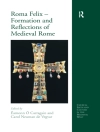Listening, experiencing, drawing or interpreting spaces: narratives, experiences, visualizations and discourses can be helpful for the empirical investigation of spaces. This interdisciplinary handbook presents a broad spectrum of established methods and innovative method development to capture and understand different facets of spaces. Instructive explanations and concrete examples make the varied qualitative methods of spatial research understandable and applicable across disciplines. The theoretical and methodological aspects of qualitative spatial research form the framework of this handbook.
Sobre o autor
Jörg Stollmann (Prof.) ist Professor für Städtebau und Urbanisierung am Institut für Architektur der Technischen Universität Berlin. Er ist Mitglied des SFB 1265 »Re-Figuration von Räumen«. Er studierte an der Universität der Künste Berlin und der Princeton University und lehrte unter anderem an der Universität der Künste Berlin und der Eidgenössischen Technischen Hochschule Zürich.












